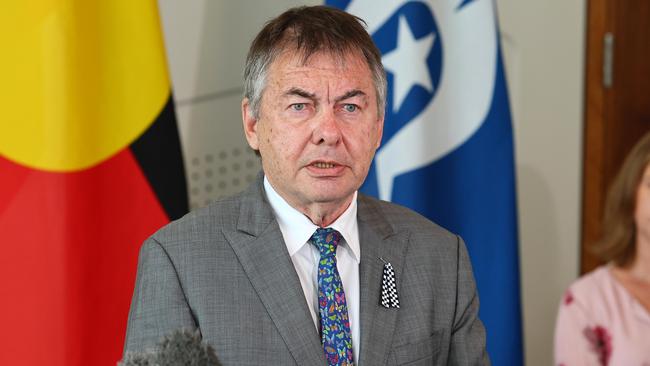ACT government challenges Lehrmann inquiry head’s review appeal
The ACT government has argued Walter Sofronoff KC’s Federal Court challenge should be dropped, as he rebuts a report accusing him of corrupt conduct.

The ACT government has argued Walter Sofronoff KC should be denied a judicial review of a scathing report on his inquiry into the prosecution of Bruce Lehrmann to protect parliamentary privilege.
Solicitor Alison Hammond appeared on behalf of ACT Legislative Assembly Speaker Mark Parton on Tuesday at a Federal Court hearing for Mr Sofronoff’s legal action against the ACT Integrity Commission.
Ms Hammond appeared as an amicus to provide legal advice on the question of parliamentary privilege without being party to proceedings, but said the report should be protected by parliamentary privilege, meaning the case should be dropped.
“The Speaker does submit that the correct legal outcome, in light of the legislation and the authorities, is that the report cannot be admitted, and that, as a seemingly inevitable consequence, the proceedings should be dismissed,” Ms Hammond said.
“But the Speaker has no vested interest in the outcome, one way or another.”
Mr Sofronoff, a former Queensland solicitor-general, is seeking a judicial review of the findings from the commission’s probe of his investigation into former ACT director of public prosecutions Shane Drumgold’s handling of Mr Lehrmann’s criminal trial.
Justice Wendy Abraham did not make a decision on Tuesday as to whether the matter would go ahead.
Ms Hammond said the commission’s report following the probe – dubbed Operation Juno – was protected once it was tabled in the Legislative Assembly, arguing any chance for judicial review was wiped away after that tabling.
“The Operation Juno report, though it was also published by the commission, is a report published by the Legislative Assembly itself,” Ms Hammond said. “It is the content of the document itself to which parliamentary privilege attaches, not merely a particular copy of the document.”
Adam Pomeranke KC, acting for Mr Sofronoff, disputed this. He argued the report was not the product of parliamentary business despite being tabled in the Legislative Assembly and therefore should not receive parliamentary privilege. “The mere tabling of a document in parliament, disconnected from any existing business of the house, or a committee, is not part of transacting the business of the house, or committee,” Mr Pomeranke said.
He also said it was crucial to separate the report tabled in parliament from the identical copy of it published by the commission on its own website, which he argued was a distinct document exempt from parliamentary privilege.
“This publication on the commission’s website outside the Legislative Assembly, a publication to the world which is doing the real damage … to Mr Sofronoff’s reputation, is the thing that gives Mr Sofronoff standing in these proceedings,” he said. “It’s very much like the member of parliament who steps outside the chamber and repeats what he or (she) just said in the chamber.”

The ACT Integrity Commission first began investigating Mr Sofronoff in May 2024 and tabled its 130-page report to the ACT Legislative Assembly in March.
The commission found Mr Sofronoff’s disclosure of confidential documents to journalists during the inquiry damaged its integrity and could possibly constitute a criminal offence, saying he was “significantly compromised” and became a “fellow traveller” with The Australian’s Janet Albrechtsen due to their repeated correspondence.
The commission found the disclosure of the report to the journalists and sharing witness statements, report drafts and notices of adverse findings to Albrechtsen could constitute a criminal offence under the Inquiries Act.
Mr Pomeranke also argued on Tuesday broad brush parliamentary privilege protections on commission findings could raise “principle of legality questions” that teetered on the brink of constitutional law, foreshadowing a potential pathway for High Court challenge should the judicial review be denied.
“The effect of the Speaker’s construction is to confer authority on the commission to determine the limits of its own jurisdiction,” he said.
“The effect of their construction is that (the commission) is free from correction, and if (it) is free from correction, (it) is, in practical terms, free to do as (it) pleases, subject only to political control, not the control of the courts.
“It is natural to recoil against the suggestion that a report like the present report, which contains admitted errors of a serious crime, cannot be the subject of judicial address.”
Ms Hammond rejected this, saying the commission made sure to alert those under investigation of adverse findings against them ahead of tabling its reports, providing a clear time when they could challenge any confidentiality orders on them and seek judicial review.
She said the decision to go ahead with the Federal Court proceedings in spite of parliamentary privilege concerns could have wide-ranging consequences for future decisions.
“It would mean … that parliamentary privilege can never attach to the content of a document, you can always have the possibility there’s another copy of the document to which parliamentary privilege does not attach,” she speculated.
“Another implication … would be that parliamentary privilege can, in fact, never attach to a document unless it is available to no one outside of the parliament. As long as anyone who is not an MP or a staffer could access the document, could then put it on their own website (and) make it available to people, then parliamentary privilege, on the applicant’s analysis, could no longer attach.
“The matter is not analogous to a member of parliament saying something in the chamber and then repeating that matter outside parliament, it is instead analogous to a member of parliament saying something in the chamber and then directing people’s attention to what was said in the parliament.”
Scott Robertson SC, acting for the commission, said continuing the matter in the Federal Court would “amount to calling into question or impeaching proceedings in parliament”.
“It’s no business of the commission to positively seek to avoid its reports being the subject of scrutiny,” he said.
“It is the business of the commission … to ensure that the privileges of the parliament are protected.”
Mr Sofronoff filed his Federal Court application in March, arguing the commission’s findings were “seriously illogical, irrational and/or unreasonable” on multiple counts and its report was riddled with jurisdictional error.
His application asserted it was his “unchallenged evidence … that he subjectively considered that it was necessary or convenient for the fair and prompt conduct of the inquiry for him to engage with journalists”, and he had no obligation of procedural fairness towards ACT Chief Minister Andrew Barr.
The Integrity Commission probe was launched after acting ACT Supreme Court judge Stephen Kaye last year found Mr Sofronoff’s behaviour during the inquiry gave rise to a “reasonable apprehension of bias”. However, he upheld the majority of Mr Sofronoff’s findings against Mr Drumgold.



